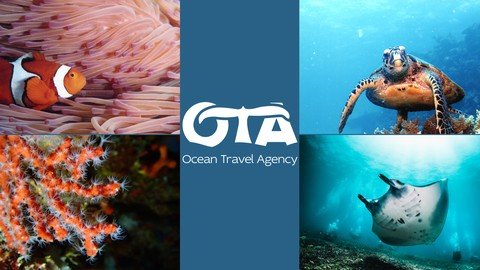Marine Biology Introduction - Mantas, Turtles And Coral Reef
Published 10/2024
MP4 | Video: h264, 1920x1080 | Audio: AAC, 44.1 KHz
Language: English | Size: 1.67 GB | Duration: 1h 46m
An exciting introduction to 3 of the most important members of the ocean ecosystem - Mantas, Turtles, and Coral Reef
What you'll learn
An introduction to Marine Biology
Understand what coral is, and the impact it has in our oceans
Learn about the lives of marine animals such as manta rays and sea turtles
Pursue an interest or career in Marine Biology
Bitesize videos for easy learning and highly qualified teachers available to assist
Requirements
No qualifications needed to start, however a keen interest in the ocean and how organisms are living there will certainly help you get the most from the course.
You can do the course on your phone, tablet or PC. You just need a connection to access the course.
There are resources provided throughout the course, so access to the internet will help with utilizing those.
You don't need a diving qualification, or snorkelling gear to start the course, but you are likely going to want both by the end!
Description
Are you fascinated by the ocean and the life it holds? Do you dream of exploring the mysteries beneath the waves, from majestic sea turtles to graceful manta rays and vibrant coral reefs? Whether you're a seasoned ocean lover or someone with a budding curiosity about marine life, the "Introduction to Marine Biology" course is the perfect opportunity to dive deep into the ocean's secrets.This online course, offered by The Ocean Travel Agency and taught by Dr. Patrizia Stipcich, a renowned expert with a PhD in Marine Biology, will take you on a journey through the wonders of the ocean. In just 2 hours, you'll gain an enriching understanding of the marine world, exploring key species and ecosystems, and learning about the challenges these creatures face today. Plus, you'll discover actionable ways you can help protect the ocean and enjoy its beauty sustainably. Best of all, there are no prerequisites-just bring your passion for the sea!Your journey will begin with one of the ocean's most beloved creatures-the sea turtle. These gentle reptiles have been around for millions of years, yet their lives remain a mystery to many. Throughout this section of the course, you'll dive into the remarkable world of sea turtles and learn:Their habitat: Where do these ancient mariners live? How do they navigate the vast oceans? You'll discover the beaches and ocean habitats that sea turtles call home.Feeding patterns: What do sea turtles eat? How do they find food in the wide, open sea? You'll explore their diets and the ecosystems they depend on.Reproduction: Watch as these resilient creatures return to the same beaches where they were born, laying eggs that will give rise to the next generation. You'll learn about the unique reproductive cycles of different species.Threats: From predators to human-induced dangers like plastic pollution and fishing nets, you'll uncover the multitude of threats that sea turtles face-and what we can do to protect them.By the end of this module, you'll be amazed at the complexity of sea turtle life and the delicate balance required for their survival. You'll also be inspired to contribute to their conservation, gaining insight into how simple actions, like reducing plastic use, can make a significant difference.Explore the Graceful Manta RaysNext, the course will transport you into the world of manta rays-one of the ocean's most awe-inspiring and graceful creatures. If you've ever dreamed of swimming alongside a manta ray, now's your chance to understand their fascinating lives. This section will coverifferent species: Did you know that there are two main types of manta rays-reef manta rays and oceanic manta rays? You'll explore the differences between these two majestic creatures, from their habitats to their feeding habits.Ecological role: Discover how manta rays fit into the ocean's ecosystem and the important role they play in keeping marine environments healthy.Relationships with other marine life: Manta rays may appear solitary, but they are connected to a web of relationships with other ocean creatures. You'll learn about symbiotic relationships and how manta rays interact with other species.Why they're a favourite: For many, manta rays are the ultimate marine animal due to their gentle, inquisitive nature and sheer beauty. Through stunning visuals and engaging facts, you'll see why they've captured the hearts of so many ocean lovers.This module will leave you with a deep appreciation for manta rays and a new understanding of how they live, feed, and thrive in the wild. You'll also learn about the threats they face, such as habitat destruction and bycatch in fishing nets, and what efforts are being made globally to protect them.No marine biology course would be complete without exploring the heart of the ocean's ecosystems-coral reefs. Coral reefs are often referred to as the "rainforests of the sea" because they support a staggering 80% of marine life. In this section, you'll delve into:What coral reefs are: Coral reefs may look like rock formations, but they're actually made up of living organisms. You'll learn how coral polyps build these intricate structures and how they form the basis of rich, vibrant ecosystems.The creatures they support: From tiny fish to massive sharks, coral reefs provide food and shelter to an astonishing variety of marine species. You'll explore how these ecosystems work and why they are so crucial to ocean health.Threats to coral reefs: Unfortunately, coral reefs are one of the most endangered ecosystems on the planet, facing threats from climate change, ocean acidification, and human activities like overfishing and pollution. This section will give you a clear understanding of these threats and how they are disrupting entire marine ecosystems.By the end of this part of the course, you'll have a newfound respect for coral reefs and their inhabitants. More importantly, you'll understand why it's so critical to protect these delicate ecosystems, not just for marine life, but for the health of our entire planet.Learn How to Make a DifferenceOne of the most empowering aspects of this course is its focus on what you can do to help. Marine ecosystems face unprecedented threats, but there are also unprecedented opportunities for individuals to make a difference. You'll learn about:Sustainable practices: From reducing your plastic footprint to supporting sustainable seafood, discover simple yet impactful changes you can make to protect the ocean.Responsible ocean tourism: Whether you're planning to dive with manta rays or visit sea turtle nesting sites, you'll get practical tips on how to enjoy the ocean's beauty without harming its ecosystems. You'll also get insider recommendations on the best places to observe these animals in their natural habitat.Supporting marine conservation: Learn about the global and local organizations working tirelessly to protect marine life and how you can support their efforts.By the end of the course, you'll feel empowered not only with knowledge but with practical ways to be part of the solution. The ocean needs us all to step up, and this course will show you how you can help preserve its beauty for future generations.This course is taught by Dr. Patrizia Stipcich, a leading marine biologist with extensive experience studying and protecting marine life. Dr. Stipcich's engaging teaching style makes complex topics accessible, and her passion for the ocean is contagious. Throughout the course, she is available to answer questions and offer further insights, ensuring that your learning experience is as interactive and enriching as possible.
Overview
Section 1: Introduction
Lecture 1 Introduction
Section 2: Sea Turtles
Lecture 2 Different Species
Lecture 3 Identification
Lecture 4 Life Cycle
Lecture 5 Diving Skills
Lecture 6 Threats To Population
Lecture 7 Plastic Pollution
Section 3: Manta Rays
Lecture 8 The Gentle Giants
Lecture 9 Types Of Manta
Lecture 10 Behaviour Study In The Maldives
Lecture 11 Plankton
Lecture 12 Feeding Habits
Lecture 13 Cleaning
Lecture 14 Identification
Lecture 15 Mating And Birthing
Lecture 16 Predators And Threats
Lecture 17 Best Places To See Them
Section 4: The Coral Reef
Lecture 18 Importance Of The Coral Reef
Lecture 19 Where Can We Find It?
Lecture 20 "Bio-Builders"
Lecture 21 Types Of Cnidarians
Lecture 22 Soft Corals
Lecture 23 Hard Corals
Lecture 24 Polyps And Zooxanthellae
Lecture 25 Coral Bleaching
Lecture 26 Threats To Coral Reef
Lecture 27 What Can We Do?
Section 5: Completion
Lecture 28 A quick thank you from Patrizia.
There are no prerequisites, so whether you're a novice or an experienced ocean enthusiast, this course is for you.,If you are studying marine and ocean based subjects at school, college or university,You are a scuba diver, freediver or snorkeller, and would like to know more about the creatures and the environment that you are visiting, especially if it is a tropical place, then this is a great foundation course to begin learning
Screenshots
Say "Thank You"
rapidgator.net:
ddownload.com:Kod:https://rapidgator.net/file/a5919df1ecc6b5cba351034d0d527a10/faidc.Marine.Biology.Introduction..Mantas.Turtles.And.Coral.Reef.part1.rar.html https://rapidgator.net/file/861c667bfaadc3daa89235c9f11270ac/faidc.Marine.Biology.Introduction..Mantas.Turtles.And.Coral.Reef.part2.rar.html
Kod:https://ddownload.com/7lfxd26gr66f/faidc.Marine.Biology.Introduction..Mantas.Turtles.And.Coral.Reef.part1.rar https://ddownload.com/uqda4v4af9x7/faidc.Marine.Biology.Introduction..Mantas.Turtles.And.Coral.Reef.part2.rar
1 sonuçtan 1 ile 1 arası
-
28.10.2024 #1Üye



- Üyelik tarihi
- 20.08.2016
- Mesajlar
- 147.735
- Konular
- 0
- Bölümü
- Bilgisayar
- Cinsiyet
- Kadın
- Tecrübe Puanı
- 156
Marine Biology Introduction - Mantas, Turtles And Coral Reef
Konu Bilgileri
Users Browsing this Thread
Şu an 1 kullanıcı var. (0 üye ve 1 konuk)



 LinkBack URL
LinkBack URL About LinkBacks
About LinkBacks






 Alıntı
Alıntı
Konuyu Favori Sayfanıza Ekleyin